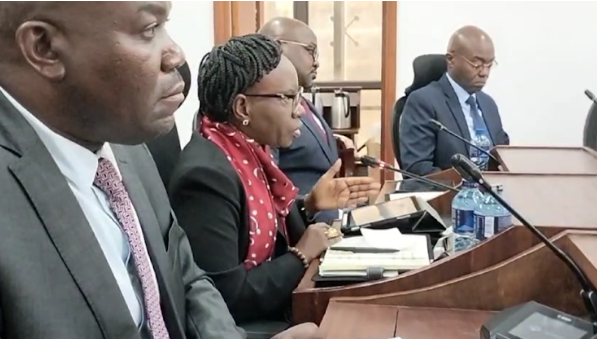Auditor General Nancy Gathungu has stated that counties should maintain no more than two bank accounts for revenue or expenditure. She emphasized that this approach would improve efficiency and facilitate better accountability and tracking of funds. Gathungu, speaking to senators on Wednesday, criticized the practice of counties holding 200 to 300 bank accounts, calling it unnecessary and inefficient.
“Apart from the requirement by development partners when they issue funds for a separate bank account, I think we should minimize bank accounts,” she said.
“We should have one or two revenue or expenditure accounts; we don’t need 300. First of all, you lose track, you put money there and forget that there’s money there.”
Gathungu, who appeared before the Senate Committee on County Public Investment and Special Funds, explained that having numerous bank accounts within a single county complicates auditing processes for her office. She noted that the practice of reallocating funds between accounts makes tracking expenditures even more challenging and troublesome for both the devolved units and the Auditor General’s office.
“Which now brings me to my biggest problem concerning counties…the law gives counties a blank cheque on how many funds they can establish so sooner than later we will have more funds in this country that are running operations of departments of counties,” she said.
For instance, she said, a county can have a fund for agriculture yet there already exists an agriculture department or an education fund yet education is a national function which is duplication.
“You’ve seen counties now have bursaries and giving bursaries to secondary schools and I thought secondary school education is under the national government,” Gathungu said.
She said to avoid all this and based on a need basis, the most a county should seek to have shouldn’t exceed 10 bank accounts.
“But more than 10 is too much, so 300 don’t make sense to me or even 200,” Garthungu said.
In her report covering expenditure by counties between June 2023 and January 2024, Controller of Budget Margaret Nyakang’o revealed that all 47 counties were operating 2,000 bank accounts in commercial banks for the first nine months of the 2023-24 financial year.
The revelation sparked concerns that some of the accounts could be used for personal dealings and expose billions of taxpayers’ funds to losses.
“The growing number of bank accounts operated by counties in commercial banks has made it more difficult for the office of the Controller of Budget to track public expenditure,” Nyakang’o said in her report.
County governments are required by law to open and maintain bank accounts at the Central Bank of Kenya for ease of tracking.
Exemptions are made only for imprest, petty cash and revenue collection accounts.
“County Executive Committee Members should be responsible and follow up and ensure compliance with the law by maintaining bank accounts at the Central Bank of Kenya for accountable spending,” Nyakang’o said.
According to the audit report, Bungoma County was operating the highest number of bank accounts (352) followed by Baringo with 304, Migori with 208 and Nyandarua with 86.
The accounts had varied functions ranging from dispensaries, county health facilities, local revenue accounts, vocational training centres, fund accounts and various other departments.



